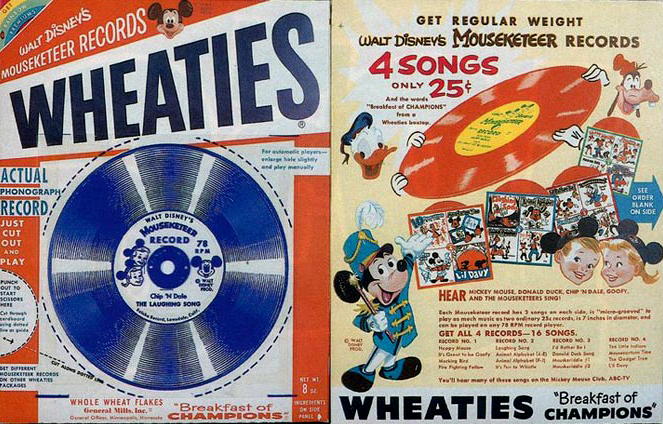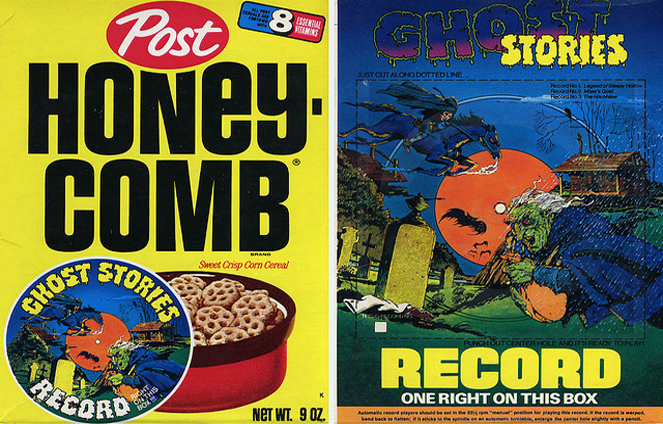
Dance During Breakfast
In 1949, Post Raisin Brand Cereal had the idea to produce records as a part
of a promotional campaign. Releasing six 78 rpms, each contained a different
fairytale, and read-along comic. This ploy, where customers could write in for
a gift (after collecting proofs of purchase), is one of the earliest known marketing
gimmicks.
In 1956, General Mills one-upped Post by releasing eight Walt Disney's Mouseketeers
78 rpm records, which came directly printed onto boxes of Wheaties cereal. The
characters Goofy, Donald Duck, and Mickey Mouse sung children's songs, such
as "Ten Little Indians" and "It's Fun to Whistle".

The cardboard was
circularly perforated, and a thin plastic record was glued to the paper packaging.
Once removed, and after a few spins on a turntable, the paper would warp or
fold, making it unplayable after a day or two. Still, if kids dug the song enough,
they could mail in a quarter, to receive a red- or orange-colored official vinyl
version.
By 1965, what became known as the "cardboard record", or "cereal
box record", had been used as a promotional tool by every major brand of
cereal in the United States. Around the late-80s, though vinyl was still big
in the underground, your average household no longer had a record player, and
the back of cereal boxes returned to having puzzles, or advertisements for brand-related
products.
Today, collectors pay hefty prices for almost any complete cereal box with an
unremoved record. Though one can find many simple cut-outs available throughout
the internet, most have been re-flattened by new designs (tape, sticks, etc.),
or re-glued to firmer cardboard.

While there are
a number of records with stories (Honey-Comb Ghost Stories); games (Life
Cereal Rock Music Mysteries); even exercises (The Toucan Sam Workout);
or a mix of all three (Count Chocula's The Monsters Go Disco), the most
sought after boxes are the Post Cereal music releases.
Let's listen to a few.
The fictional comic book band The Archies released (in '69 and '70) almost 20
different cereal box records. The 5.5" discs contained all their hits of
that time: from "Bang-Shang-A-Lang" to "Sugar, Sugar".
Post Cereal, who
were openly referring to themselves as "music lovers", then thought
to sign on one of the biggest acts of the day: The Monkees. In 1969 and 1970,
the band let the cereal company put out a dozen of their biggest hits on the
back of Alpha Bits, Honey-Comb, and Frosted Rice Krinkles boxes. "I'm A
Believer", "Last Train to Clarksville", and "I'm Not Your
Steppin' Stone" were all available, free, to almost any kid whose parents
bought them breakfast.
Another collectors'
favorite are the eight Jackson 5 6" records (also by Post Cereals), released
on boxes of Alpha Bits and Frosted Rice Krinkles. In 1971, the group had signed
on for the discs, but also appeared in the company's commercials.
One of the last
great Post signings was Bobby Sherman, who released close to twenty cardboard
records on boxes of Cinnamon Raisin Bran, Honey-Comb and Frosted Rice Krinkles
in 1972.
After proving itself
to be the huge marketing scheme it was, the popularity of the cereal box record
had a lot of companies thinking to throw in a cheap record along with almost
any product.
In 1966, Mad Magazine's mascot Alfred E. Neuman released a paper record
for the comedy track "It's A Gas" inside one of its issues. While
one may only notice the burps, do know that the saxophone is provided by an
uncredited King Curtis.
In Chicago, Fairmont
Potato Chips released The Shadows of Knight 1967 single "Potato Chip"
on a flexi 7" attached to the chip's bag.
Nowadays, you can
press an actual record straight onto the cardboard itself, or press one up on
plastic, metal, or even wood. With the resurgence of vinyl, and the public gaining
interest in format sound quality, we may soon see new techniques that will bring
this near-forgotten form of advertising back to life. I, for one, really look
forward to hearing that.
A. Souto, 2016
BACK TO MUSICA OBSCURA ARTICLE LIST